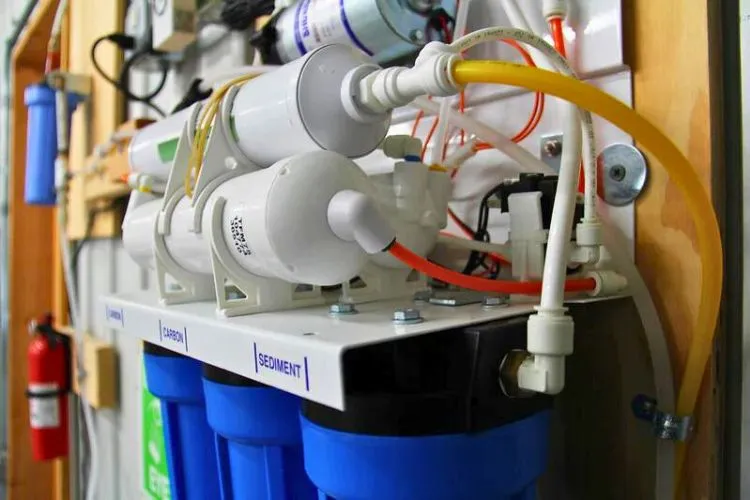Fluoride in drinking water is a topic of enduring interest. Opinions vary widely on its presence in our taps, from staunch support due to dental benefits to vehement opposition based on health concerns.
With so much focus on water purity, many homeowners turn to water softening solutions.
But, does a water softener remove fluoride?
Well, many homeowners often wonder whether these systems can remove fluoride.
This article aims to clarify the effectiveness of water softeners with respect to fluoride reduction and will explore alternative treatment options.

💦 Understanding Water Softeners
To discern whether water softeners are capable of removing fluoride, we must first understand what they are designed to do. Water softeners are systems engineered to alleviate water hardness.

Hardness is primarily due to the presence of calcium and magnesium in the water, which can lead to lime scale buildup in plumbing and hinder the effectiveness of soap and detergents.
The technology behind water softeners, ion exchange, is elegant in its simplicity. As hard water passes through a resin bed inside the softener, positively charged calcium and magnesium ions are replaced with positively charged sodium or potassium ions.
The result is that the water becomes “soft,” as hardness minerals have been removed.
💦 Fluoride in Water: An Overview
Fluoride is well-known for its inclusion in dental care products and municipal water systems. Its addition to public water supplies has been a widespread public health measure, intended to help prevent tooth decay.

While fluoride can occur naturally in various degrees in water, the levels are often augmented in public water systems to reach a concentration deemed beneficial for dental health. The debate around the addition of fluoride to drinking water has ebbed and flowed over the years.
Proponents point to reduced dental cavities in broad populations, while critics cite potential health risks associated with excessive fluoride intake, including dental fluorosis and other concerns.
As such, some individuals prefer to remove fluoride from their drinking water, regardless of its public health benefits.
💦 Does A Water Softener Remove Fluoride?
The crux of our discussion rests on the capabilities of water softeners to address the presence of fluoride in drinking water.
Despite the effectiveness of water softeners in removing minerals such as calcium and magnesium, they do not remove fluoride.
The reason lies in the ionic nature of the fluoride itself. Because fluoride is a negatively charged ion and water softeners are designed to capture positively charged ions, fluoride passes through these systems untouched.
This limitation of water softeners is critical for consumers to note.
While they excel at addressing issues like preventing scale and prolonging the lifespan of household appliances, water softeners are not equivalent to water filters and do not serve the same purpose when it comes to removing contaminants such as fluoride.
💦 Alternative Methods to Remove Fluoride
Those seeking to remove fluoride from their water supply have several options available. Among the most effective are reverse osmosis systems and activated alumina filters.

Reverse osmosis is a process where water is forced through a semi-permeable membrane. This membrane allows water molecules to pass through but blocks larger compounds, including fluoride ions.
Reverse osmosis can remove up to 90% of fluoride in water, making it one of the most reliable methods for those who wish to eliminate fluoride entirely.
Activated alumina, another effective method, works by adsorbing fluoride ions onto its surface. It’s a highly porous form of aluminum oxide that binds with certain contaminants.
When water passes through a bed of activated alumina, fluoride is trapped in the filter media. It’s important to note that both reverse osmosis and activated alumina systems require regular maintenance and filter changes to function optimally.
💦 Making an Informed Decision
Deciding whether to remove fluoride from your water, and which method to use, is contingent on several factors. Homeowners should consider their motivations for doing so, be it for personal health reasons or taste preferences.

Furthermore, they should factor in the practical considerations of installing and maintaining additional water filters, such as a reverse osmosis system or activated alumina filter.
Those unsure of their current fluoride levels can obtain water quality reports from local utilities or employ a water testing kit for an accurate assessment. A detailed understanding of these levels will inform the decision-making process for choosing the appropriate water treatment solution.
Professionals in the field of water treatment can provide valuable insight and aid in the selection and installation of water purification systems. They serve as a resource for ensuring the chosen method aligns with individual needs and local water conditions.
💦 Frequently Asked Questions (FAQs)
Does reverse osmosis remove fluoride?
Yes, reverse osmosis systems can remove a significant amount of fluoride, generally up to 90%.
Are there water filters that remove fluoride and chlorine?
Yes, certain types of water filters, such as reverse osmosis systems and activated alumina, can remove both fluoride and chlorine from water.
Can I use a Brita filter to remove fluoride?
Standard Brita filters are not designed to remove fluoride, though they may offer other filters that do.
Is it important to remove fluoride, and why?
The importance of removing fluoride depends on individual preferences and health concerns. Some choose to remove it due to potential health risks, while others keep it for its dental health benefits.
Conclusion:
In summary, water softeners are not designed to remove fluoride from your water. They target hardness-causing minerals such as calcium and magnesium but do not affect fluoride due to its negative charge.
Those seeking to reduce fluoride levels should explore other filtration methods, such as reverse osmosis or activated alumina, which are specifically engineered to tackle this concern.
Hence, while water softeners contribute to water quality by addressing hardness, they alone cannot fulfill the role of fluoride removal.

Devon Shorts, a seasoned expert with over a decade of experience in water safety, shares valuable insights on this blog “Aqua Safety Plus”. Trust his expertise to keep your water clean and your family safe.
